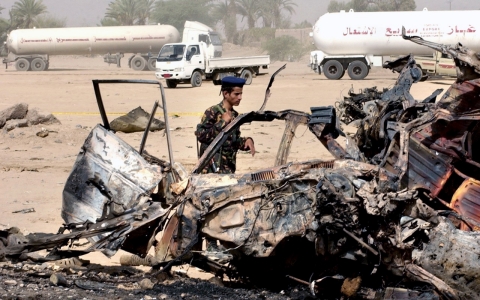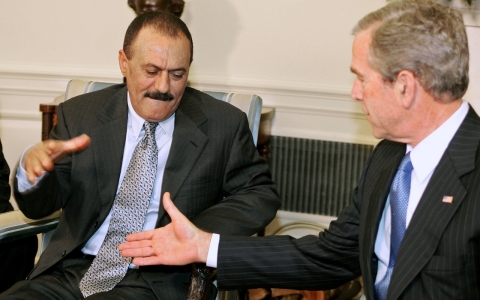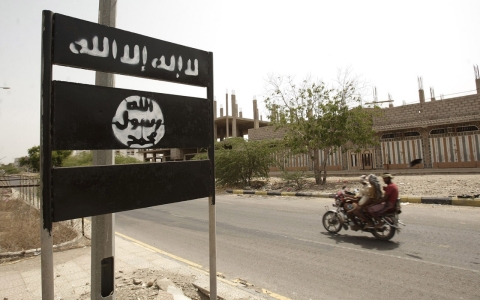Ali Abdullah Saleh’s government in Yemen supported and even helped direct Al- Qaeda in the Arabian Peninsula (AQAP), according to allegations made to Al Jazeera’s Investigative Unit.
A former Al-Qaeda operative who says he later became an informant for the Yemeni government made the claim during three days of interviews in a location outside the Gulf.
Hani Muhammad Mujahid, 38, told Al Jazeera that “many Al-Qaeda leaders were under the complete control of Ali Abdullah Saleh,” who was ousted as Yemen’s president in February 2012 amid a popular uprising. “Ali Abdullah Saleh turned Al-Qaeda into an organized criminal gang. He was not only playing with the West. He was playing with the entire world.”
Mujahid’s claims appear in a new documentary, Al-Qaeda Informant, which can be viewed in the YouTube player above.
The film explores Mujahid’s claims that:
Mujahid said he was a member of Al-Qaeda starting in the late 1990s, when he traveled from Yemen to Afghanistan, trained at Al-Faruq camp and met Osama bin Laden. He became an explosives expert and taught other Al-Qaeda fighters how to use explosives, losing his right thumb in an accident during that period.
After the 9/11 attacks, Mujahid, who went by the nom de guerre Abdul Hakim Jan, and other Al-Qaeda operatives found themselves under attack by U.S. forces in Afghanistan. After fighting at Shah-i-Kot in March 2002 and other battles, he crossed the border into Pakistan’s tribal areas, from which Al-Qaeda continued fighting. In 2004 he was detained and interrogated by Pakistani intelligence as well as by U.S. agents.
Al Jazeera has been unable to independently verify Mujahid’s account of his roles in Afghanistan with Al-Qaeda or in Yemen as a government informer, but we have shown the transcripts of his interviews to intelligence experts.
“It certainly seems that Hani Mujahid is who he says he was when he was in Afghanistan,” said Bob Grenier, a former CIA station chief in Pakistan. “I can’t swear that he was a senior trainer at the Al-Faruq Camp, but virtually everything that he says tracks with what I know about where Al-Qaeda was, how they were operating, what they were doing, particularly from 9/11 onward.”
Mujahid was returned to Yemen after his detention in Pakistan, and Yemeni authorities released him from prison in August 2006 — after which, he said, he became a paid informant on Al-Qaeda, receiving $500 per month from the National Security Bureau (NSB) and $250 per month from the Political Security Organization (PSO).
Richard Barrett, who was with Britain’s MI6 intelligence agency before becoming director of the United Nations Al-Qaeda Monitoring Team, described Mujahid’s story of his background in Afghanistan, his return to Yemen and his involvement with AQAP as “credible.”
Mujahid claimed that his information on the 2007 and 2008 attacks was ignored. “On one occasion, when I met with Ammar Muhammad Abdallah Saleh, he said to me, ‘Hani, you are a treasure, a treasure of information. You must be loyal to your homeland.’ I took this at the time to be an encouragement to work more diligently and make more efforts. But eventually they let me down.”
Barrett and Grenier have analyzed and assessed Mujahid’s claims of his time in Yemen from 2006. Grenier believes 70 percent of what he says is “genuine,” with 30 percent embellished in order to make his assertions appear “more credible.”
“I think that he is legitimately prey to a conspiratorial mindset,” said Grenier. “I think that he may genuinely believe things that we would regard as implausible.”
“I see in a man telling you his story,” said Barrett, with “a bit embellished here or something left out there.”
“But essentially, the story I would say is true up to these real points of Col. Ammar knew about the American Embassy bombing, Col. Ammar knew about the Spanish tourist attack, as did other people in PSO and NSB, and that Qasim al-Raymi was also working with the Yemeni government, so they had a very close cooperation there,” Barrett said.
“Those are the bits that you really think, ‘Now can this be true? Is it true? This really needs looking into,’” he said.
Mujahid said he is willing to testify in front of any international panel of investigation in order to achieve justice.
Spanish police briefly visited Yemen in July 2007 to investigate after the car bombing. They gathered little beyond forensic evidence.
Al Jazeera has learned that Yemeni authorities responded to an initial request for information but that when Spanish prosecutors requested more details on several occasions, they received no reply. The Spanish case is now closed unless new information comes to light.
U.S. officials with the FBI investigated the 2008 embassy attack and also gathered a range of forensic evidence. “We did the best we could,” the legal attaché in Yemen, Richard Schwein, told Al Jazeera. “But then, as time went on, the investigation stalled.”
“Complicity on the part of one or more members of the Yemeni government would be very disappointing, but it wouldn’t necessarily be surprising,” he said.

Informer says authorities knew in advance about first major attack by Al Qaeda in Yemen and could have averted it

How an Al-Qaeda fighter turned informer for Yemen’s government, only to conclude it was duping Washington

Western counterterrorism focus has made accusations of secret ties to the group staples of Yemen power struggles






Error
Sorry, your comment was not saved due to a technical problem. Please try again later or using a different browser.